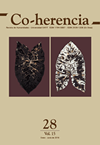Spinoza: homo homini Deus
Main Article Content
Keywords
true good, emendation of the intellect, violent state, democracy, libertas philosophandi, separation between faith and philosophy
Abstract
Throughout these pages I will tackle: a) the meaning of understanding or knowing the "true good"; b) the necessary internal conditions to achieve this understanding and c) the method that should be followed. Then I will focus on analyzing the external conditions: a) that the largest number of people should reach this goal (hence the title of this article) and b) the existence of political and religious conditions that I will detail.
Downloads
References
Burckhardt, T. (1972). Alquimia, Barcelona: Plaza&Janés.
Buyse, F. (2013). Boyle, Spinoza and the Hatlib Circle: The Correspondance which never took place. Society and Politics, 7(2), 34-53.
Domínguez, A. (1990). Spinoza. En F. Vallespín (Ed.), Historia de la Teoría política, 2, Madrid: Alianza.
Domínguez, A. (Ed.). (1992). La Ética de Spinoza. Fundamentos y significado. Actas del congreso internacional: Almagro, 24-26 de octubre, 1990. Cuenca: Ediciones de la Universidad de Castilla-La Mancha.
Gebhardt, C. (1977). Spinoza. Buenos Aires: Losada.
Hilb, C. (2005). Leo Strauss: el arte de leer. Una lectura de la interpretación straussiana de Maquiavelo, Hobbes, Locke, y Spinoza. Buenos Aires: F. C. E.
Hobbes, T. (1983). Leviatán. Madrid: Editora Nacional.
Israel, J. (2002). Radical Enlightenment. Philosophy and the Making of Modernity 1650-1750. New York: Oxford University Press.
Klever, W. (1987). ‘The Helvetius Affair or Spinoza and the Philosopher’s Stone’. A document on the background of Letter 40. Studia Spinozana, (3), 439-458.
Metzger, H. (1969). Les doctrines chimiques en France du début du XVIIe à la fin du XVIIIe siècle, Paris: Albert Blanchard.
Nadler, S. (2001). Spinoza. A Life. Cambridge: University Press.
Popkin, R. H. (2004). Spinoza. Oxford: Oneworld.
Rosenthal, M. (2001). Spinoza’s Dogmas of the Universal Faith and the Problem of Religion. Philosophy & Theology, 13(1), 53-72. doi: 10.5840/philtheol20011317
Spinoza, B, (1980). Ética demostrada según el orden geométrico (V. Peña, Ed.). Madrid: Editora Nacional.
Spinoza, B, (1986). Tratado teológico-político (A. Domínguez, Ed.). Madrid: Alianza.
Spinoza, B, (1986). Tratado político (A. Domínguez, Ed.). Madrid: Alianza.
Spinoza, B, (1988). Correspondencia (Ed. Atilano Domínguez). Madrid: Alianza.
Spinoza, B, (1988). Tratado de la reforma del entendimiento (A. Domínguez, Ed.). Madrid: Alianza.
Spinoza, B, (1990). Tratado breve (A. Domínguez, Ed.). Madrid: Alianza.
Strauss, L. (1996). Persecución y arte de escribir y otros ensayos de filosofía política. Valencia: Edicions Alfons el Magnánim.
Villaverde, M. J. (2002). Spinoza, Rousseau: dos concepciones de democracia. Revista de Estudios Políticos, (116), 85-106
Villaverde, M. J. (2010). Prólogo al Tratado Teológico-Político. Madrid: Tecnos.
Villaverde, M. J. (2011). Spinoza: persecución, ateísmo, alquimia. En M. J. Villaverde y J. C. Laursen (Eds.), Forjadores de la tolerancia (pp. 67-99). Madrid: Tecnos.
Villaverde, M. J. (2012). Spinoza’s Paradoxes: An Atheist who defended the Scriptures? A Freethinking Alchemist? En J. C. Laursen, & M. J. Villaverde (Eds.), Paradoxes of Religious Toleration in Early Modern Political Thought (pp. 103-112). Lanham, Md: Lexington Books.
Villaverde, M. J. (2017). Spinoza y la alquimia. En M. L. de la Cámara y J. Carvajal (Eds.), Spinoza y la Antropología en la Modernidad (pp. 103-112). Hildesheim: Georg Olms Verlag.




